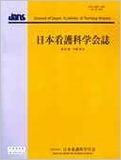Japanese
English
- 販売していません
- Abstract 文献概要
- 参考文献 Reference
要旨
目的:本研究は2010年と2014年に全国調査を行い,退院支援看護師(DPN)の実践状況を明らかにすることを目的とした.
方法:全国の100床以上の病院に勤務するDPNに,2010年は819名,2014年は948名に質問紙調査を行った.調査項目はDPNの基本属性,DPNとしての実践能力(Nurses' Discharge Planning Ability Scale:NDPASの得点)等.
結果:2010年はDPN461名(回答率56.3%),2014年は479名(50.5%)を分析対象とした.両年とも平均年齢は約47歳で,DPNの平均経験年数は2010年が2.5年,2014年が3.1年であった.また,2014年の方がNDPASの〈A.退院後のケアバランスの見積力〉の得点が高かったが,残り3つの能力の得点については両年で有意差がなかった.
結論:DPNによる支援の質を保証する為には,系統的・継続的な人材育成の必要性が示唆された.
Purpose: To elucidate discharge planning nuring (DPN) practices, we conducted nationwide surveys in 2010 and 2014.
Methods: We administered nationwide questionnaire surveys to DPNs working at hospitals of 100 beds or more—819 nurses in 2010, and 948 nurses in 2014. The survey items were primary attributes of DPNs, practice ability as DPNs (Nurses' Discharge Planning Ability Scale (NDPAS) score), etc.
Results: Subjects were 461 DPNs in 2010 (response rate 56.3%), and 479 in 2014 (response rate 50.5%). The mean age during both years was approximately 47. The mean years of experience for DPNs was 2.5 in 2010 and 3.1 in 2014. In addition, the scores for “A. Ability to Estimate Postdischarge Care Balance” in the NDPAS were higher in 2014, but the scores of the other three abilities were not significantly different between the two years.
Conclusions: Results suggest the necessity of systematic and continuous human resource development to ensure quality support by DPNs.
Copyright © 2017, Japan Academy of Nursing Science. All rights reserved.


